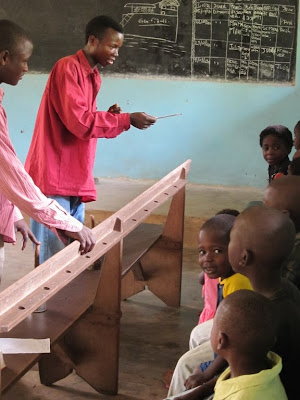
I hadn’t planned to be at Vanga a second time this week. I had already spent half a day trying to track down batteries and a barrel of gasoline. There were things to do at Lusekele. But the Minister of Social Affairs and an entourage of government dignitaries announced that they would descend on Vanga and Timothee thought ACDI Lusekele should be represented. The government wanted a public memorial service for the people who perished in a riverboat accident. Many of the victims were people in villages where we have worked for years; some were undoubtedly people from our CBCO churches.
You may have heard about the accident. The overloaded boat ferrying goods and traders from the Kwilu River to Kinshasa encountered rough water on the Congo River. Riding low in the water, it was swamped and capsized, dumping more than 200 passengers into the river. Many couldn’t swim; at least 138 perished.
 The waiting crowd is in a festival mood. Political banners fly next to the Congo flag. As time passes, the sun rises higher in the sky and conversations blossom in the shade.
The waiting crowd is in a festival mood. Political banners fly next to the Congo flag. As time passes, the sun rises higher in the sky and conversations blossom in the shade.Death is never easy to deal with. Death due to poorly regulated and over taxed transport systems (both road and river) is tragic. The Minister of Social Affairs communicated the concern of the Prime Minister himself. Good instincts brought the government to Vanga. To be sure, political instincts. But also the instincts that God put in us to care for innocent lives lost, people with limited options just trying to make a living, for justice, for commitment to justice and to righting wrongs. The expression of condolences is certainly a worthy reaction of the country’s leaders. It was a recognition that so much more might be done to prevent reckless practices and pointless loss of life.
The subtext of the day, however, is what happened while local dignitaries, traditional chiefs, pastors, school directors, sports clubs, political party adherents, anxious police, and curious kids all waited for the delegation. The plane was scheduled to arrive at 9am. It didn’t land until 3pm. What do 350 waiting people do to fill the dead time? Find some shade and talk. Conversations blossomed with immigration agents, village chiefs, teachers, pastors, storekeepers, government officials.
 Miriam talks with the two chefs de groupement as we all wait for the Minister of Social Affairs and government delegation.
Miriam talks with the two chefs de groupement as we all wait for the Minister of Social Affairs and government delegation.Many people still have little idea of what the church is doing, and what God has done already to provide stable food supplies and better income for rural people in our region. Miriam told people about chaya, a perennial leafy vegetable that can be grown in a living fence. I talked with a political party member about coherent plans for shaping the country and choosing disciplined parliamentary representatives. We both talked with traditional chiefs about caring for the land and the improved production that new manioc varieties could give their people. I shared ACDI’s experience with soil-sustaining legumes and continuous corn production with the chief of Songo, a village that has run out of land. Conversations ranged to the importance of reading and education for family well being and the role of Christians in the government. More seeds planted in the shade while waiting for delayed government leaders to make their gesture.
I’m glad we were able to be there. It was important to recognize the terrible loss of victims, their families, and the country. Christians understand that God mourns the pointless waste and wants people in power to bring life-giving change to Congo. But waiting in the shade turned out to be the unexpected work of that day -- with people we would never have encountered at the office at Lusekele.
-- Ed













